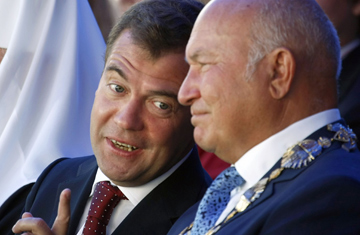
Russian President Dmitri Medvedev, left, talks to Moscow Mayor Yuri Luzhkov in Moscow in this Sept. 5, 2009, file photograph
It had long been predicted, following each in a string of corruption scandals and outbreaks of seeming lunacy. Still, when Moscow Mayor Yuri Luzhkov was fired on Tuesday, Sept. 28, much of the city was in disbelief. For some, that feeling was mixed with joy, because the mayor made a lot of enemies while clinging to power for 18 years. For others, it came with dread, since the dismissal of Luzhkov, considered by many to be the third most powerful man in Russia, is sure to tear a hole in the political system. But for the man who fired him, President Dmitri Medvedev, the resulting panic inside the mayor's office likely produced a sense of accomplishment. This one act has moved Medvedev out of the shadow of his patron, Prime Minister Vladimir Putin, and cast him as a political fighter as he looks ahead to a second term.
Medvedev's personal victory didn't come easy — it came only after the kind of power struggle Russia hadn't seen since the cage-match politics of the '90s. It began in August, when Luzhkov suffered his latest embarrassment. Compared with some of his previous misadventures — crushing peaceful protests with riot police, banning gay-pride marches as "satanic," allegedly giving his wife's real estate firm the best property in town, promising (and failing) to stop the city's heavy snowfall last winter — this one was fairly mild: refusing to come home from holiday while Moscow was surrounded by wildfires, the heat and smoke doubling the city's death rate, to 700 a day.
But the Kremlin saw it as a chance to get rid of another of Russia's political dinosaurs, the regional leaders who dug in after the fall of the Soviet Union and have ruled their regions like fiefdoms ever since. This year alone, Medvedev has negotiated the removal of two such governors, who agreed to resign in exchange for retirement packages and the right to leave their own men in positions of power. That is how such matters are normally resolved in Russia. Luzhkov, however, would not go quietly, at least not on Medvedev's terms. So the Kremlin went on the offensive.
Starting Sept. 10, state television aired a series of vicious attacks against Luzhkov of the kind usually reserved for leaders of the opposition. It accused him of corruptly helping make his wife the richest woman in Russia and suggested he cared more for his collection of honeybees — which he had evacuated during the August fires — than he did for the people of Moscow. The city's television station and its local council rose to Luzhkov's defense; the mayor himself denied the accusations as "filth"; and his wife put the attacks down as political maneuvering ahead of the elections. But on Sept. 20 the Kremlin gave him seven days to consider an ultimatum: resign in peace, or get fired in disgrace.
A week passed, and the mayor went to work on Sept. 27 with his usual defiance, leaving many pundits to conclude that he had come out on top against the President. But the mayor's luck had run out. On Tuesday, Medvedev announced he was firing Luzhkov "for having exhausted the trust of the President" — the harshest terms allowed by Kremlin etiquette.
The gravity of this news in Russia's political circles was perhaps best expressed by Sergei Mironov, head of a pro-Kremlin political party, who wrote a single line on his blog: Sic transit gloria mundi — "Thus passes the glory of the world." Inside city hall, the mood was no less apocalyptic, says councilman Andrei Klychkov, as Luzhkov hid in his office while his former deputy — now the acting mayor — presided over the council chamber. "The atmosphere was extremely nervous," Klychkov, a communist, tells TIME. "Removing the mayor means putting all of his ministers and henchmen in limbo ... and that is almost every official in Moscow."
But Luzhkov's ouster will also resonate far beyond the capital, because virtually all of Russia's business, media and political structures are headquartered on his turf. Before the presidential elections of 2012, the Kremlin will need to install a mayor who can reshuffle and recalibrate the whole bureaucracy. If Medvedev fails, he opens himself up to potential sabotage from Luzhkov loyalists ahead of the elections.
"In the short term, this is a major success. The people of this country like a hero, the kind with pig-iron fists that he bangs against the table, and Medvedev has finally shown that he can play this role," says Evgeny Gontmakher, a political analyst in Moscow. "It seems clear now that he is preparing for a second term." This does not mean running against Putin, as the two have stated they will decide between themselves who will be the best candidate. But it will mean following through with a kind of political toughness that has not been Medvedev's forte.
Tatyana Pavlova, who headed a department in the mayor's office from 2000 to 2006, says the shock waves from Luzhkov's firing could be felt for a long time to come. "His financial chain of command has allowed the city's bureaucrats to fill their pockets for years," she says. "If they feel that chain collapsing from the top, they will panic, steal as much as they can and work as little as possible before the purge reaches them." This includes everyone from policemen to garbage collectors, Pavlova says, an army of apparatchiks who might make a mess for Medvedev as he gets ready for the elections. He may have won this battle, but the war has only just begun.
